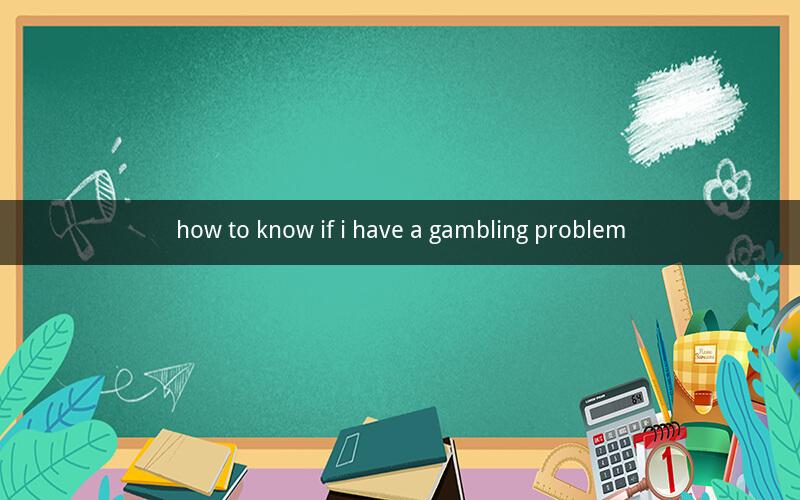
Table of Contents
1. Understanding Gambling Addiction
2. Recognizing the Signs of a Gambling Problem
1. Financial Consequences
2. Emotional and Psychological Effects
3. Social and Personal Relationships
4. Legal and Ethical Implications
3. Assessing Your Gambling Behavior
1. Self-Reflection
2. The Gamblers Anonymous Checklist
3. Professional Help
4. Seeking Support and Treatment
1. Support Groups
2. Therapy and Counseling
3. Residential Programs
5. Preventing Future Gambling Issues
1. Setting Limits
2. Avoiding Triggers
3. Building a Support Network
1. Understanding Gambling Addiction
Gambling addiction, often referred to as compulsive gambling, is a behavioral disorder characterized by an inability to control the urge to gamble despite harmful consequences. It is a complex issue that can affect individuals of all ages, backgrounds, and socioeconomic statuses. Understanding the nature of gambling addiction is the first step in recognizing and addressing a potential problem.
2. Recognizing the Signs of a Gambling Problem
Identifying the signs of a gambling problem is crucial for early intervention and treatment. Here are some common indicators:
2.1 Financial Consequences
- Unpaid bills or loans
- Borrowing money from friends or family
- Selling personal belongings to fund gambling
- Financial stress or anxiety
2.2 Emotional and Psychological Effects
- Feeling guilty or ashamed
- Withdrawal from friends and family
- Depression or anxiety
- Mood swings or irritability
2.3 Social and Personal Relationships
- Arguments with loved ones over gambling
- Isolation
- Loss of interest in hobbies or activities
- Difficulty maintaining employment
2.4 Legal and Ethical Implications
- Legal problems due to gambling debts
- Engaging in illegal activities to fund gambling
- Breaching ethical standards in personal or professional life
3. Assessing Your Gambling Behavior
To determine if you have a gambling problem, consider the following:
3.1 Self-Reflection
- Reflect on your gambling habits and how they have changed over time.
- Acknowledge any negative consequences that have arisen from your gambling.
3.2 The Gamblers Anonymous Checklist
- Use the Gamblers Anonymous checklist to evaluate your gambling behavior and identify potential issues.
3.3 Professional Help
- Seek advice from a mental health professional who specializes in gambling addiction.
4. Seeking Support and Treatment
If you recognize signs of a gambling problem, it is essential to seek support and treatment. Here are some options:
4.1 Support Groups
- Join a support group like Gamblers Anonymous, where you can share experiences and receive encouragement from others in similar situations.
4.2 Therapy and Counseling
- Work with a therapist or counselor to address the underlying issues contributing to your gambling problem.
4.3 Residential Programs
- Consider residential programs that offer structured treatment and support for individuals struggling with gambling addiction.
5. Preventing Future Gambling Issues
To prevent future gambling issues, implement the following strategies:
5.1 Setting Limits
- Establish and stick to a budget for gambling activities.
- Set time limits for gambling sessions.
5.2 Avoiding Triggers
- Identify and avoid situations or environments that may trigger your gambling urge.
5.3 Building a Support Network
- Surround yourself with supportive friends and family who understand your struggles and can help you stay on track.
Questions and Answers
1. Q: What is the most common cause of gambling addiction?
A: While there is no single cause of gambling addiction, it is often a combination of factors, including genetic predisposition, environmental influences, and personal vulnerabilities.
2. Q: Can someone with a gambling problem recover?
A: Yes, many individuals with gambling problems can recover with the right support and treatment. Recovery is a process that requires commitment and ongoing effort.
3. Q: How can I tell if my gambling has become a problem?
A: Look for signs such as financial strain, emotional distress, social isolation, and legal issues. If you are struggling to control your gambling and it is affecting your life, it may be time to seek help.
4. Q: Are there any medications that can help treat gambling addiction?
A: While there are no medications specifically designed to treat gambling addiction, some medications may help manage symptoms of co-occurring disorders, such as depression or anxiety.
5. Q: Can I overcome a gambling problem on my own?
A: While some individuals may be able to overcome their gambling problem with self-help strategies, many find that seeking professional support and joining a support group is more effective.
6. Q: How long does it take to recover from a gambling problem?
A: Recovery from a gambling problem can vary widely among individuals. Some may experience immediate relief, while others may require ongoing treatment and support for years.
7. Q: Can a gambling problem affect my family?
A: Yes, a gambling problem can have a significant impact on family members, leading to financial strain, emotional distress, and strained relationships.
8. Q: Are there any online resources for those struggling with gambling addiction?
A: Yes, there are many online resources available, including support groups, counseling services, and educational materials.
9. Q: Can I still enjoy gambling if I have a gambling problem?
A: It is essential to recognize that if you have a gambling problem, it is best to avoid gambling altogether. Engaging in gambling activities can exacerbate your problem and hinder your recovery.
10. Q: What should I do if I suspect a loved one has a gambling problem?
A: Encourage your loved one to seek help and offer your support. You can also reach out to a professional who can provide guidance on how to approach the situation.